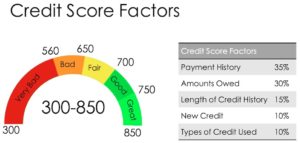A credit score (also known as a FICO score) is a number that determines the likelihood that you will be able to pay back money that you have borrowed from lenders. It is a number between 300 and 850 and it is based on several factors, such as the number of accounts you currently have open, the total amount of your current outstanding debt, your repayment history, the amount of credit you have available to you, the age of your oldest debt, and other factors. This information is found in one of the three credit reporting agencies: Experian, TransUnion, and Equifax.

Table of Contents
What is a credit score used for?
The credit score was initially used as a metric by which a lender could easily determine the creditworthiness of an individual. Since it shows your debt payment history, it is also used to determine the likelihood of you paying any bill, not just debt-related bills. This has made the use of a credit score broader than originally intended.
When you apply for insurance, such as auto insurance, some insurance companies will also look at your credit score. Based on a 2003 study performed by the McCombs School of Business at the University of Texas at Austin, there is a correlation between the credit score and the number and cost of claims. The lower the credit score, the higher the probability that a loss will be incurred and thus a claim. Also when a loss is incurred, the amount of the claim will be higher for an individual with a lower credit score. Thus, people with better credit scores tend to pay less for their insurance premiums and people with lower credit scores tend to pay more and may even be denied coverage.
Potential employers may use your credit score when looking at you for employment. The employer is looking for signs of financial distress which could lead to a higher risk of theft or fraud. A lot of late payments in your history may indicate that you are not organized and responsible, thus not a quality candidate. If the job being applied for involves the handling of money, a low credit score could indicate that you may not be able to fulfill the obligations of the job.

How is a credit score determined?
There are five factors that combine to generate your credit score. They are payment history, the amount owed, length of credit history, types of credit you have, and your recent credit activity. Let’s examine each in detail.
Payment History
Your payment history accounts for 35% of your overall score. This tells lenders and others if you have made your past payments on time. Having late or missed payment is an indicator of a high-risk borrower.
Amount Owed
The amount of debt you currently owe accounts for 30% of your overall score. Having open accounts and owing money does not in and of itself indicate a high-risk borrower, but when compared to other factors, such as your income, it can reveal whether or not you have the ability to pay existing and future debts.
The amount you owe is used to determine your debt-to-income ratio, which plays a factor when lenders are determining your creditworthiness. Your debt-to-income ratio is calculated by taking the total debt you currently own and dividing it by your gross monthly income.
Total Debt = $1,500
Gross Monthly Income = $3,500
Debt to Income Ratio = 43%
Lenders typically want to see the debt to income ratio be below 35%.
Length of Credit History
The amount of time you have been using credit accounts for 15% of your overall score. The longer your history of on-time payments, the higher your score will be. Having debt is not good for being Financially Grounded, but having no history with credit will hurt your credit score.
Types of Credit You Have
The different types of credit you have accounts for 10% of your overall score. Having a mix of credit such as an auto loan, a mortgage, and a credit card may improve your score, provided that you are handling this burden appropriately. Having multiple types of debt and being late is worse than having only 1 debt and being on time with your payments.
Recent Credit Activity
Your recent credit activity accounts for 10% of your overall score. If you have opened a lot of accounts recently or applied to do so it can be seen as potential trouble and lower your score.



What rights do you have with regards to a credit score?
We’ve seen all the different factors that go into making a credit score and what a credit score can be used for. With all of these areas impacted there is also room for error on the part of the lenders and other reporting agencies. You have rights with regards to your credit that you can exercise to dispute and correct inaccuracies in your credit report and thus improve your credit score. Let’s examine each of these rights.
- You have the right to know what your credit report contains.
- You have the right to receive a free copy of your credit report, once a year, from each of the three credit reporting agencies: Experian, TransUnion, and Equifax.
- You are also entitled to a free report if a company takes adverse action against you with regards to your credit, such as denying employment, insurance policy, or extending credit.
- A lender is prohibited from credit discrimination on the basis of sex, race, marital status, national origin, religion, or age. You may be asked for any of this information in the application process, but it cannot be used against you.
- You have the right to have collection agencies report only validated debts.
- A subset of these rights pertains specifically to debt collection. Let’s look at those also.
- Debt collectors may contact you only between 8 am and 9 pm.
- Debt collectors may not contact you at work if they know that your employer does not allow such contact.
- Debt collectors may not harass, oppress, or abuse you.
- Debt collectors may not lie in order to collect a debt.
- Debt collectors must identify themselves as such to you on the phone.
- Debt collectors must stop contacting you if you ask them to in writing.
How to build (or rebuild/repair) your credit?
If you are just starting out and have no credit history, there are several ways to build your credit. Let’s look at them now.
Establish a banking relationship
Open a checking and savings account. Keep the account in good standing to show that you are responsible for the handling of money.
Be consistent and stable
Lenders look for a stable income, a good work history, and a place of residence. Income that fluctuates and erratic work history may be seen as signs of financial stress to a lender.
Use a secured credit card
A secured credit card is like other credit cards with the exception that it requires a cash security deposit. This deposit protects the card issuer in the event that you don’t pay your bill. On-time and consistent payments are reported to the credit reporting agencies.
Keep open credit cards
Open credit lines will improve your credit utilization. It also increases the types of credit you have, thus improving the score. Use the credit line once in a while to keep them in an active status.
Rebuild your credit score
Rebuilding your credit score using the same techniques that building your score does. In addition to those techniques, there are other steps too. Let’s look at them.
- Pay off your debt and keep low balances on credit cards. Pay off the debt, wait a few months, then add a bit of debt back, then pay it off, then wait a few months. Repeat.
- Apply for new accounts only when necessary.
- Dispute any inaccuracies on your credit reports.
- Seek the counsel and help of a professional credit repair service. Credit Saint is one of the highest rated in the industry.
- Use a credit monitoring service to keep tabs on your credit so you are aware of any changes that might impact it. Credit Karma is the most popular credit monitoring service available with an excellent record.
- Use a service to provide periodic boosts to your credit score, such as Experian Boost.
In Conclusion
Credit is a tool. Like any tool, if used properly it can help you. If misused it can cause great harm. Be conscious of this as you start to build your credit. If you find yourself misusing credit in an effort to build your credit, STOP. Better to have no credit than bad credit.
More information can be found at the following:
Related Topic
See my article on What You Need to Know About Debt for additional information.

Pingback: What You Need to Know About Debt - Financially Grounded
With havin so much written content do you ever run into any issues of plagorism or copyright violation? My website has a lot of exclusive content I’ve either authored myself or outsourced but it looks like a lot of it is popping it up all over the web without my authorization. Do you know any methods to help reduce content from being ripped off? I’d really appreciate it.